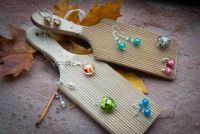Street-wise
‘My uncle grew olives.’
‘We’re a long way from home.’
How did the Romans fetch olives from the mediterranean to the north of England? Everything has a price. Amphorae are pots designed to transport wine or oil. Fixed quantities and quality from southern Spain groves barcoded ‘QMCCCAS’ on the handle of an amphora broken in Turret 44b at Mucklebank crag midway between the Roman Army Museum and Aesica Fort now on show at the Great North Museum.
Transported by sea, river and road, just like today, where high class local and exotic goods are one of the attractions of Corbridge. In Roman times a civilian town or vicus grew around the military, where locals and foreigners meet, haggle, swap gossip as well goods and services – soothsayers, tooth-pullers, gambling dens, (the Romans loved a good punt) the oldest professions.... Not just face-to-face; writing and money means on-line shopping without the internet. See if you can work this out through the writing tablets at Vindolanda. You can’t buy anything down vicus streets at Corbridge today, so get its feel at Hexham Shambles Market Monday to Saturday – altogether a good day out by train and/or bus, anytime of the year.
Bling
‘If that goes down the plug-hole.’
We live in dread of invaluable jewelry disappearing down the bathroom sink…..
 In the commandant's toilets at Housesteads (extra-special because as you know, Roman men didn’t just pee communally!) archaeologists found a gold finger ring set with a single garnet intaglio of an actor’s mask. Intaglio is an image cut into a gem, often used as a seal to authorise a document – effectively a signature. In the days of identity theft, losing that ring is losing your personal ID. For such a small item it’s a pretty big piece of Bling.
In the commandant's toilets at Housesteads (extra-special because as you know, Roman men didn’t just pee communally!) archaeologists found a gold finger ring set with a single garnet intaglio of an actor’s mask. Intaglio is an image cut into a gem, often used as a seal to authorise a document – effectively a signature. In the days of identity theft, losing that ring is losing your personal ID. For such a small item it’s a pretty big piece of Bling.
The commandant would’ve have known where it went, and just as clearly they never found it however hard they tried. Now at the Great North Museum it’d probably have foxed Dyna-rod, and think of the poor squadies given this detail.
Not lost but buried. The Aesica Hoard found at Great Chesters Fort is also at the Great North Museum. How did it become buried in the first place? A bank deposit box-worth of coin and jewelry, no one’s sure – a miser’s baubles, a suitcase of cash for a dodgy deal that didn’t go down… visit the Museum or Fort and devise your explanation.
Roman jewelry’s big – or is ours small?
Taste
‘Fancy a take-away?’
When Queen Elizabeth II was crowned no one had heard of pizzas, and the only take-aways were fish-and-chips wrapped in newspaper of the coronation – as well as wine and the olive, the Roman invasion brought dates, figs, walnuts, eating apples, coriander…. walk the vicus streets of towns outside Corbridge fort and inside the civitas of Carlisle and smell the tagines of Morocco, Bretonesque mussels, chicken coriander – dishes brought in by the auxilary soldiers of the empire and Garum a fermented mass-produced fish sauce exported from the Mediterranean which the Romans loved to give taste perhaps nearest to today’s Lea & Perrin’s or Soy Sauce. Stone bottles were reused as urinals in forts along the Wall. Waste not, want not in Street Cooking AD122.
 Drink. In vino veritas (‘In wine the truth’ – whoever said it first must’ve been drunk) but what did the locals quaff? "Beer is living proof that God loves us and wants us to be happy," (Benjamin Franklin) No one’s sure, but at Tynedale Beer Festival in Corbridge you’ll find some of the best of beers in Britain, and quite possibly the World. Though the Roman Empire brought exotic food to Britain, perhaps today it’s the other way round – people come to Hadrian’s Wall Country for the local produce.
Drink. In vino veritas (‘In wine the truth’ – whoever said it first must’ve been drunk) but what did the locals quaff? "Beer is living proof that God loves us and wants us to be happy," (Benjamin Franklin) No one’s sure, but at Tynedale Beer Festival in Corbridge you’ll find some of the best of beers in Britain, and quite possibly the World. Though the Roman Empire brought exotic food to Britain, perhaps today it’s the other way round – people come to Hadrian’s Wall Country for the local produce.


.gif)


 button to add an item to your Itinerary basket.
button to add an item to your Itinerary basket.
